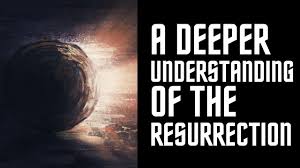The Reason for our hope
If someone were to ask us about Jesus’ resurrection, what would we say? Could we give a good reason as to why we believe in the resurrection? But more importantly, are we able to witness to an unbelieving world why we follow Jesus?
It is not my intent to teach apologetics. However, as followers of Christ, it is important that we “be ready to always give an answer to the reason for our hope” (1 Pet. 3:15). Understanding the resurrection will inform our life—our identity, our power, and our purpose. To do this, like the disciples, we need to clearly understand the “what and why” of resurrection. The Gospel of Luke captures Jesus’ teaching this truth as He prepared the Disciples for their commissioning.
After the resurrection
The gospel of Luke gives us insight into Jesus’ teaching of the resurrection to the disciples. Written to a Greek audience, this gospel was written to convince readers of the truth of the things they had heard of Jesus (Luke 1:4). The most controversial event being Christ’s resurrection. In Luke 24, we see how Jesus deals with the unbelief of His disciples. He then seeks to reverse that unbelief by broadening their understanding. Within this chapter are two (2) accounts for our learning.
On the road to Emmaus (vv. 13-33), two disciples of Jesus (Cleopas and one unnamed) were walking from Jerusalem to Emmaus on resurrection Sunday. Joined by Jesus (whom they didn’t recognize) they proceeded to tell of the crucifixion and the recent report of Jesus’ empty tomb. Jesus would use this time with the disciples as a “teachable moment.” He gave a lesson on the prophecies of the Old Testament which were fulfilled in His death and resurrection. “And beginning at Moses and all the Prophets, He expounded to them in all the Scriptures the things concerning Himself.” (Luke 24:27) After Jesus’ departure, the disciples then understood because Jesus “opened” the scriptures to them.
Likewise, when Christ appeared to the ten disciples (vv. 36-49), a similar understanding was needed. After several proofs that He was alive, Jesus “opened” their minds to understand the Scriptures.” (Luke 24:45). Opened in these two (2) encounters means to rouse in one the faculty of understanding. While the disciples may have heard this teaching before in the synagogue or through other teachers, Jesus caused them to make the connections from Scripture and the events they had recently experienced. In addition, they had Holy Scripture and prophetic proof that the resurrection of Jesus was a reality ordained and empowered by God Himself (Eph. 1:19-20).
The essentials of the resurrection
It was critical that Jesus solidify with the disciples their understanding of the resurrection. The resurrection was more than an historical or miraculous event. It was the promise of new life and a blessed hope. (Luke 4:18-21)
Unfortunately, we have allowed the busyness of our calendars and distractions of the world, to reduce the resurrection to a “one and done” attitude. We celebrate Easter Sunday, acknowledge the resurrection, eat the eggs, and then go back to our daily routine on Monday.
We have reduced the resurrection to a “transaction”—an event that occurred thousands of years ago. “Jesus rose from the dead therefore I am free from sin.” To think of resurrection this way limits the impact it can make in our daily life.
Resurrection is not transactional. It is transformational and relational. Resurrection for believers is the beginning of a life changing, intimate relationship with God the Father, Jesus our Lord, and the Holy Spirit.
Resurrection understanding in 2021
Why is this important for us today? Because with Christ’s resurrection, we have an opportunity to “new life” that is found by our faith in Jesus Christ (Gal. 2:20). It is in the resurrection that victorious living begins.
This season of Easter (Eastertide) affords believers the opportunity to celebrate more than the grace and mercy of God on Good Friday. As important, we can depend on God’s power and Jesus’ victory beginning on Resurrection Sunday AND extending through out eternity.
Spend time during this season learning more about the resurrection and the extraordinary blessings that are now ours. Let the Bible and the Holy Spirit (as your Teacher) “open” your mind to the resurrection. Begin with the synoptic gospels (Matthew, Mark, and Luke). Then explore the prophetic proofs found in the Old Testament. These will expand your understanding and help you answer the questions that begin with “why”.

